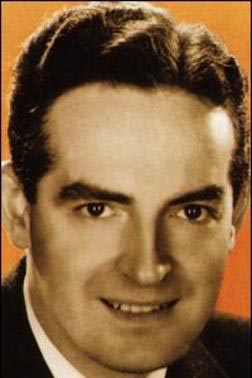In Celebration of the Human Voice - The Essential Musical Instrument
Home | Doo Wop | Barbershop | World | Contemporary | Christian | Vocal Jazz | Choral | Christmas | Instructional | Arrangements
Classical | Opera | Musicals | Personality | Young Singers | Disney | Videos | Songs | The Artists

Fred Waring Biography

Click Here for Sheet Music and Songbook Vocal Arrangements
Fred Waring's career in the music business spanned more than sixty years. Though his early orchestra was highly successful with its novelty effects and collegiate dance music, it was his later vocal chorus that is best remembered today. The Fred Waring Glee Club was organized in the 1930s and quickly set the standard for choral groups to come. Waring is often called ''The Man Who Taught America How to Sing.'' Raised in his father's Harrisburg, Pennsylvania, music store, Waring studied violin as a youth and was a member of his high school glee club. He formed his first professional band around 1916, a six-man string outfit called Waring's Banjazztra. After graduating from college he took the group to Detroit, where it began to attract the attention of the local music crowd. He later dropped banjo from the line-up and changed the name of the group to the Pennsylvanians. The newly-named orchestra soon became a favorite on the collegiate circuit. Their first recording, ''Sleep,'' on the Victor label in 1924, was a tremendous success. Waring's orchestra supposedly has the distinction of being the first to record a George Gershwin tune, the first to record a rumba, and the first dance band to record with a vocal chorus. Aside from Victor the group also released material on the Columbia label. Vocalists included Stuart Churchill and Waring's own brother, Tom. In the late 1920s an argument broke out between radio broadcasters and musicians. Smaller stations, unable to afford live performances, had begun to broadcast recorded music. No system of royalty payments existed at the time, and the Artists Protective Society, a group representing musicians and bandleaders, claimed this practice was cutting into performers' incomes. In 1929 the APS demanded that artists be compensated for use of their recordings. Waring was passionate about the issue and decided to take a stronger stance. Beginning in 1930 he refused to make any further recordings unless a system for royalty payments was instituted. Waring maintained this position for more than ten years before he again entered the studio in late 1941, signing with Decca. During most of the 1930s Waring's music was only available at live performances or through his radio show, sponsored by Old Gold Cigarettes. Waring's early repertoire consisted of peppy rhythms, novelties and period vocals. By the 1930s, however, the band had become much smoother and more musical. Waring also began to feature more and more choral music in his performances. The Waring Glee Club originally traveled and recorded as part of the Pennsylvanians but split off into its own unit during the 1940s. Glee Club alumni include actresses Rosemary Lane, Priscilla Lane, and Lola Lane. Johnnie ''Scat'' Davis was featured vocalist with the orchestra during the mid-1930s. Waring appeared on several radio shows over the years and had his own television program from 1949 to 1954. He was also an inventor and entrepreneur, creating and manufacturering the Waring Blender. Fred Waring died in 1984. Groups DirectedMedia Articles
Fred Waring Videos |
Select a Category |
Want to Sing? - Find a Chorus Near You
List of Choruses by State | List of Choruses by City

